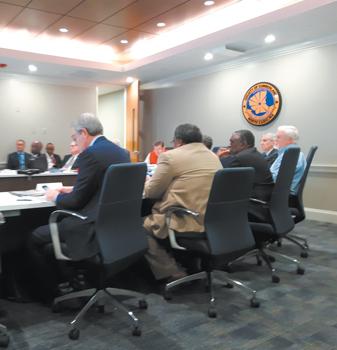 Cumberland County’s governing board has asked the community’s legislative delegation to repeal the sunset provision of the local Prepared Food and Beverage Tax. Commissioners made their request Feb. 11 at a joint meeting with local North Carolina Senate and House members. Sen. Ben Clark, D-District 21, had mentioned prior to the meeting that it will soon be time to end the tax or share its proceeds with local municipalities.
Cumberland County’s governing board has asked the community’s legislative delegation to repeal the sunset provision of the local Prepared Food and Beverage Tax. Commissioners made their request Feb. 11 at a joint meeting with local North Carolina Senate and House members. Sen. Ben Clark, D-District 21, had mentioned prior to the meeting that it will soon be time to end the tax or share its proceeds with local municipalities.
The tax, also known as the restaurant tax, was imposed in 1993 to help pay for the Crown Coliseum at the county entertainment complex off East Mountain Drive.
The sunset provision will take effect in 2024 when the debt on the Crown Coliseum is paid off. The law as written requires that the restaurant tax be ended. But commissioners have plans for the revenue estimated at $3.3 million. The $3.3 million is the annual supplement the county makes in Coliseum debt service. Once the debt is retired, the money can be used for other things, unless the legislature enforces the sunset clause.
That raised the question among some, including Clark, as to why there was a sunset provision in the law that created the tax 25 years ago. Rep. Billy Richardson, D-District 44, who served in the state House at the time and was recently re-elected, said citizens would have been even more opposed to the Bubba Dome had that provision not been included. Bubba Dome was a nickname for the coliseum at the time.
The county has been considering building a performing arts center, probably in downtown Fayetteville, using restaurant taxes to help pay for it.
“We’ve been talking about this for at least five years,” said County Commission Vice-Chairman Marshall Faircloth. He added that the tax proceeds are “do or die” when it comes to a performing arts center.
Another proposed change in the law is that the Civic Center Commission be authorized to construct a performing arts center whether or not it is affiliated with the existing civic center commonly known as the Crown Complex.
Commissioners also disclosed a set of other requests it had for the state legislature. One of them is a change in the law governing public health nuisances.
Counties are virtually powerless to deal with anything dangerous or prejudicial to public health or safety without going through a laborious process. The county is asking for the same authority the North Carolina General Assembly has granted cities and towns. The city of Fayetteville, for example, has statutory authority to remove, abate or remedy everything in the city limits and within one mile of the city found to be a health or safety hazard.
Commissioners also favor adding a percentage to the sales tax in support of rural volunteer fire departments; repealing statutory authority given boards of education to sue county governments; and seeking state participation in the Grays Creek public water project in areas affected by possible GenX contamination. The exact amount of the proposed sales tax increase has not been determined.
The 90-minute meeting ended without either governing body taking any action.